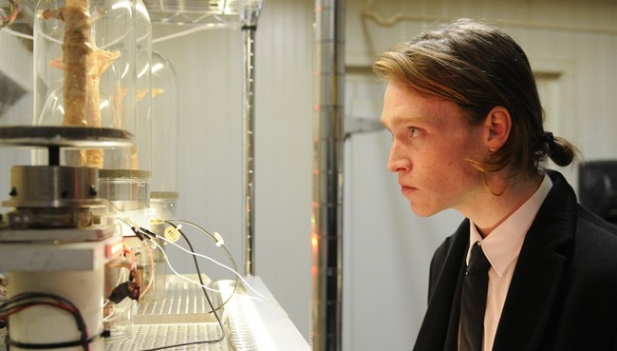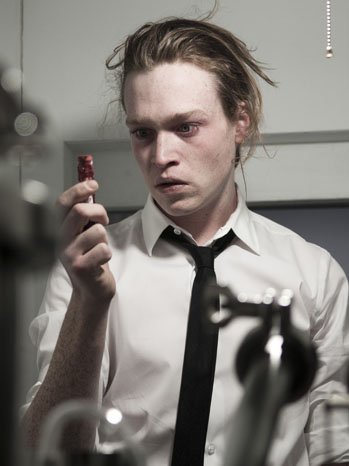After watching Antiviral, the debut feature film from Brandon Cronenberg, there is a sense that the young filmmaker has been influenced by a myriad of different types of films and genres. Son of one of the kings of paranoid sci-fi, David Cronenberg (who is also at the festival with his new film Cosmopolis), lil’ Cronenberg is definitely paying homage not just to his father but iconic auteurs such as Stanley Kubrick and David Lynch. It sounds like a potential winning formula for fans of bizarre and surreal futuristic cinema, yet Anitviral‘s effectiveness is underwhelming due mostly to the first-time filmmaker’s pitfalls, most of the film feeling like an amateurish, high-budget student film.

The plot, if you can call it that, centers around Syd March (played with droopy doe-eyed malice by Caleb Landry Jones), a technician/salesman who works at some sort of ultra-modern plastic surgery clinic. Only instead of removing wrinkles with Botox or melting away those unwanted pounds in your abdomen, Syd is selling viruses that celebrities have at one point contracted in their lives, such as Herpes, Chlamydia and other fun STDs you would want to pay good money for. By extracting samples from a subject, the technicians are able to manipulate with photoshop precision these coveted diseases into warped distortions of the human face revealing the essence of the malady. But for Syd, these samples are something more personal as his struggles with a Tetsuo: The Iron Man-like mutation of metal and blood.
The reason for this twisted futuristic dystopia (which looks a whole lot like Canada) celebrity obsession has become the soul raison d’être for people to continue on with their miserable lives. It’s hard to not to elicit metaphorical comparisons to Hollywood’s obsession with celebrity and all things plastic, but Cronenberg has a difficult time honing in one one thematic through-line, instead focused on all kinds of imagery. From the THX-1138-inspired, white-walled aesthetic in the clinic to a grungy deli where they sell synthesized celebrity muscle tissue for consumption, there is little consistency to the visual style, becoming a messy hodgepodge of homages to other, more accomplished filmmakers. Repetitive macro close-ups of needles and blood serve only to shock rather than give depth to any kind of message. To make matters worse, the dialogue is super stilted and intentionally ambiguous, resulting in awkward, badly-paced scenes that begin to pile on top of each other.

Yet there’s no denying Cronenberg’s ambition to tackle big out-there concepts and introduce some interesting commentary about our paranoid and obsessive tendencies as a society. The cinematography (courtesy of Karim Hussain) stands out, utilizing high-definition digital lensing effectively in vacuum-sealed set designs further amplified by ominous techno fueled drones and beats. Still, there is a sense that the film is slightly undeserving of its Cannes prestige for a first-time filmmaker, most likely resulting (and confirmed rather oddly by Thierry Fremaux at the film’s premiere) from a case of nepotism. Even the brief presence of Maclom McDowell as a seasoned clinic technician feels arbitrarily random, along with pitiful supporting roles played by what seems to be college buddies of the director. By the end of Antiviral, you will be clamoring for hand sanitizer to disinfect the gross residue of blood and bile that’s been left splattered over your eyeballs, for no real reason it would seem.

